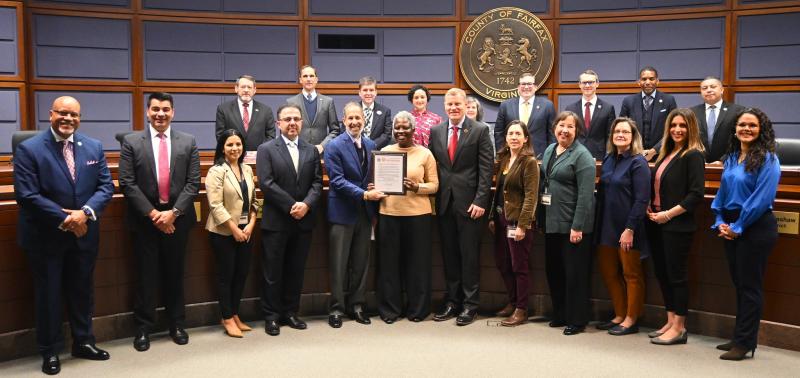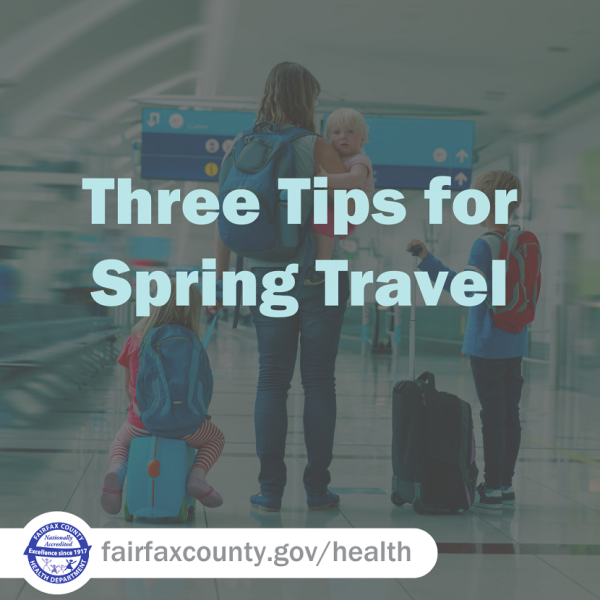April 15, 2024
Meet 40-year laboratory scientist Mary Louise Kolodziej who works behind the scenes every day to support screening, diagnosis, monitoring, and treatment of disease.
Medical Laboratory Professionals Week is an annual celebration that highlights the contributions of laboratory professionals. This year’s theme, The Future is Lab, celebrates laboratory professionals who meet today’s evolving patient care and public health challenges with resilience, innovation, and expertise. In Fairfax County, Public Health Laboratory Scientist Mary Louise Kolodziej has spent the last 40 years doing her part to identify and slow the spread of disease in Fairfax.
“When I was little, I really wanted to be a teacher,” said Mary Louise. “But I began watching Quincy, M.E. [a crime investigation and mystery series on TV] and he [actor Jack Klugman] worked in a lab and figured things out… I thought, ‘wow, this is really neat!’.”
Inspired by her favorite TV show, Mary Louise took accelerated science courses in high school and explored the possibilities of working in a lab. She attended Cedar Crest College in Allentown, PA and earned a degree in biology in 1982. Mary Louise’s first job out of college was for the Fairfax County Health Department as a laboratory aide. At the time, the Health Department’s laboratory was located in a small square building on Chain Bridge Road next to the Masey building.
“Back then, we were called microbiologists and chemists. The lab conducted urinalyses, serology testing, hematology, environmental and water testing, rabies testing… and we had a designated area for tuberculosis [TB] testing,” said Mary Louise. “We also used a lot of glassware back in the day – we ran the autoclave to sterilize and decontaminate, and we physically went out into the field to collect specimens.”
Lab professionals often work behind the scenes. Even though they don’t interact directly with patients, their work is instrumental in health outcomes. Few people understand the critical nature of the testing they perform every day. An estimated 70 percent of all decisions regarding a patient's diagnosis and treatment, hospital admission, and discharge are based on laboratory test results. Doctors rely on laboratory test results to make informed patient diagnoses. While patient history and physical symptoms are vital, most diagnoses require confirmation through laboratory testing. “You have to be organized, pay attention to detail, and have good communication skills,” said Mary Louise. “Even though we don’t see the patients, the specimens BECOME our patients.”
During the early part of her career, Mary Louise was particularly drawn to Tuberculosis testing. “…but we only screened specimens by reading slides and observing growth on culture media,” said Mary Louise. “Cultures that grew would be shipped to the public health lab in Richmond for identification and susceptibility testing.”
Under the guidance of the lab director at the time, Mary Louise was tasked with bringing TB testing fully in-house. She was sent to Richmond to work with the Virginia Department of Health technologists to learn how they conducted TB testing and brought those skills back to Fairfax, which soon became the second public health laboratory in Virginia certified to conduct full TB testing.
Over the years, her affinity for TB testing has caught the eye of the Association of Public Health Laboratories (APHL) who photographed Mary Louise demonstrating proper TB testing techniques which are now a part of the APHL TB training modules. She’s also been invited to speak on the inner workings of the TB Laboratory at the annual TB Control and Newcomer Health Nurse Training Program for Virginia public health nurses working with TB clients. And Mary Louise was honored with the annual American Lung Association of Virginia Award with honors significant contributions to prevent and control TB in Virginia.
During her tenure with the Health Department, Mary Louise has witnessed firsthand how laboratory sciences have adapted to changes within the community. She was instrumental in assisting the lab adding HTLV-III testing (before it was called HIV/AIDs) and was a part of the team that brought on hepatitis and chlamydia testing.
“Those were the days when we had to cart our own microscopes and our bag of supplies to each district office during STI clinic hours,” said Mary Louise, adding “There’s always some new organism or new disease – it’s critical that we stay up to date, attend conferences, continue our education. Over the years, we’ve added toxicology and testing for drug use and misuse. When COVID came, that was a major undertaking. We handled thousands upon thousands of specimens and rearranged our lab for PCR [polymerase chain reaction] equipment. We even had to open a second lab, the Burkholder building, to accommodate our testing.”
And while Mary Louise has more than 40 years with the Health Department lab, there is no risk of her slowing down quite yet. “One day I’ll hang up my lab coat and fade into the sunset,” Mary Louise shared jokingly. “I don’t plan to do anything too exciting when I retire – I am looking forward to just being able to kick back, put my feet up, and not have to go anywhere.”



![]()
![]()
![]()
 Don’t wait, get caught up on well check-ups and recommended childhood immunizations now!
Don’t wait, get caught up on well check-ups and recommended childhood immunizations now! 
